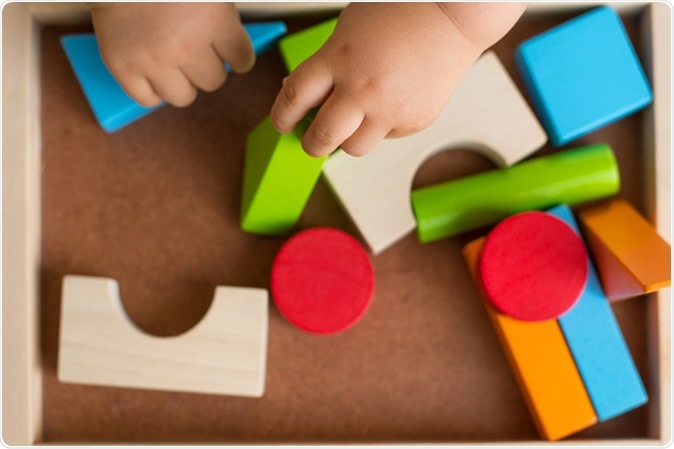Researchers have found that being separated from parents at a young age could lead to a rise in stress hormones, which could have direct consequences on altering the genetic makeup of the child, which can then be passed on to the future generations. The study titled, "Childcare outside the family for the under-threes: cause for concern?" was published in the latest issue of the Journal of the Royal Society of Medicine.

Image Credit: AKIRA PHOTO / Shutterstock
The study reveals that toddlers under the age of three who are being cared for in inadequate quality child care facilities outside the home for over 30 hours per week have raised levels of stress hormone level cortisol in them. This was significantly higher when compared to children who were being cared for at home. Professor Sir Denis Pereira Gray, Emeritus Professor of General Practice at the University of Exeter, and his colleague explained, "Cortisol release is a normal response to stress in mammals facing an emergency and is usually useful. However, sustained cortisol release over hours or days can be harmful." Professor Gray is also the President of the children's charity What About the Children?
The team explained that over the last century, there had been a change in child-rearing and parenting. They explained that cultures are significant determinants of child-rearing practices and over the years, parents, more importantly mothers, are central to the parenting dynamics. They added that women and mothering changed in the 20th century due to the advent of educational and employment opportunities for women as well as due to culture of female emancipation. This has led to more and more women stepping out for work and an increasing dependence on child-rearing day care services outside the home. The authors wrote, "In England, 75% of women with dependent children work (Office of National Statistics, 2019), while their very young children are often placed in daycare with carers unknown to the child." They added that the governments promote this because women are significant contributors to the gross domestic product and in this manner the person and centres caring for the child also contribute to the GDP. Overall working women are also countering poverty, wrote the researchers. They added, "In the UK, a substantial bonus to reduce childcare costs is paid per child to working parents."
This new culture of working parents has led to increased dependence on daycare services for the children. The team wrote that newborn babies, unlike most mammals, are born helpless to accommodate their brains to pass through the birth canal. Thus human babies need more time to become independent and grow their big brains compared to babies of other mammals. The authors explained that babies are programmed to "demonstrate increased brain activity only with their mother's face," and mothers can "detect their own baby's cry in a crowd of crying babies." In this situation the babies suffer from severe anxiety when separated from their mothers. They wrote, "A child's hormonal bonding system is compromised by disrupted attachments since the reduced synthesis of oxytocin receptors follows frequent maternal separations." This could also mean that the child may have difficulty in forming bonds with their partners when they grow up.
This separation during childhood can lead to a rise in stress hormones as well as alteration of neuronal circuits of the brain, they wrote. Stress leads to a feeling of being in danger, and that causes changes in the hypothalamus near the pituitary gland in the brain, causing a release in the adreno-corticotrophic hormone (ACTH). ACTH stimulates the brain to release cortisol. Rising cortisol diverts the blood flow to the muscles to prepare for danger in a "flight or fight" response. Thus there is reduced blood supply to the vital functions such as digestion, immunity, protein synthesis, organ growth, and development, etc. Earlier cortisol could be measured only in blood and thus was difficult to measure in young children. Now it can be measured non-invasively from the saliva, wrote the researchers.
The time spent away from biological parents raises stress in these children, and this could be more important than earlier believed, wrote the researchers. They explained that boys under stress could become more aggressive. Cortisol levels also contribute to a reduction in antibody levels and alteration of parts of the brain that deal with the stability of emotions, the researchers wrote. The team wrote that researchers from the United States have found that cortisol levels are greater in 63 percent children in daycare and 40 percent of these children were found to be stressed. The genetic changes have also been reported, wrote the authors stating, "Methylation of the promoter of the human glucocorticoid receptor gene is associated differentially, with low levels of parental care, parental death or childhood maltreatment."
The team added that this stress is only seen in a fraction of kids spending time in such daycare, and not all of them are similarly affected. They stated, "Most children in nurseries are not affected but as many as 40 percent may be."
The authors added, "Environmental factors interact with genes so that genes can be altered, and once altered by adverse childhood experiences, can pass to future generations. Such epigenetic effects need urgent study." This means that the raised cortisol is capable of altering the DNA of the kids that could be transmitted to the next generations. Sir Dennis said, "Future research should explore the links between the care of small children in different settings, their cortisol levels, DNA, and behaviour."
Journal reference:
Pereira Gray, D., Dean, D., & Dean, P. M. (2020). Childcare outside the family for the under-threes: cause for concern? Journal of the Royal Society of Medicine. https://doi.org/10.1177/0141076820903494